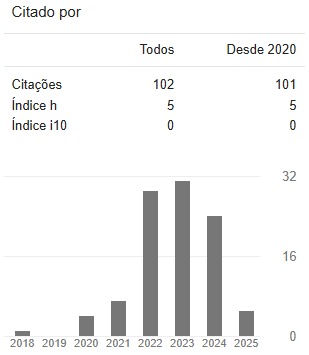Mudança no paradigma: humanizando o gênero no Ser
Paradigm shift: humanizing gender in Being
DOI:
https://doi.org/10.35642/rm.v7i1.931Palavras-chave:
Gênero Binário, Heteronormatividade, Identidade de Gênero, Serviço SocialResumo
O viés progressista que apoia a militância LGBTQIA+ na busca pela liberdade de expressão e efetividade dos direitos, torna-se fato social, demarcado por conquistas e tragédias na sociedade contemporânea. O Serviço Social, como profissão interventiva, protetiva e fomentadora dos Direitos Humanos, assume tanto em suas diretrizes orgânicas, como na responsabilidade técnico-científica, a defesa do Bem-Estar Social sob a condição da diversidade humana, em qualquer circunstância. Assim, deve não apenas proteger, mas ampliar as possibilidades sociais dos sujeitos que divergem das imposições heteronormativas. Ainda assim, faz-se necessário maior atenção e entendimento por parte da formação e do exercício profissional, que necessita, como a maior parte da sociedade, compreender as questões de gênero e da sexualidade.
ABSTRACT
The progressive bias that supports LGBTQIA+ militancy in the pursuit of freedom of speech and the effectiveness of rights becomes a social fact, marked by achievements and tragedies in contemporary society. Social Work, as an interventional, protective profession that promotes Human Rights, assumes both in its organic guidelines and in its technical-scientific responsibility, the promotion of Social Well-Being under the condition of human diversity, in any circumstance. Thus, it must not only protect, but also expand the social possibilities of subjects who differ from heteronormative impositions. Even so, greater attention and understanding is needed on the part of training and professional practice, which needs, like most of society, to understand gender and sexuality issues.
Keywords: Gender Binary, Heteronormativity, Gender Identity, Social Work.
Downloads
Referências
ALBERNAZ, L. S. F; LONGUI, Márcia. Para compreender gênero: uma ponte para relações igualitárias entre homens e mulheres. In: SCOTT, P., LEWIS, L.; QUADROS, M. T. de. (Orgs.). Gênero, diversidade e desigualdades na educação: interpretações e reflexões para formação docente. Recife: Ed. UFPE, 2009. (p. 75-96).
BILGE, Sirma. Théorisations féministes de l'intersectionnalité. Diogène, Paris, v. 01, n, 225, p. 70-88, 2009. Disponível em: https://www.cairn.info/revue-diogene-2009-1-page-70.htm. Acesso em: 13 maio 2023.
BERLANT, L.; WARNER, M. Sexo em público. In: JIMÉNEZ, R. M. M. (Org.). Sexualidades transgresoras: um antología de estudios queer. Barcelona: Icaria, 2002. (p. 229-259).
BRITO, N. C. de. Jürgen Habermas: Obras Escolhidas – Fundamentação Linguística da Sociologia. Volume I. Comunicação Pública, Lisboa, v. 17, n. 11, p. 155-162, 2012. DOI: https://doi.org/10.4000/cp.317.
BUTLER, J. Excitable speech: a politics of the performative. Londres: Routledge, 1997.
BUTLER, J. Problemas de gênero: feminismo e subversão da identidade. Rio de Janeiro: Civilização Brasileira, 2003.
CARDOSO, A. Imposição de Gênero: a Violência de uma Cultura Heteronormativa. 2018. Dissertação (Mestrado em Serviço Social) – Instituto Superior Miguel Torga. Lisboa, 2018. Disponível em: https://dspace.ismt.pt/bitstream/123456789/960/1/DISSERTAÇÃO_AldrynCardoso_pdf. Acesso em: 13 maio 2023.
COSTA, R. P. da. Os onze sexos: as múltiplas faces da sexualidade humana. Caieiras-SP: Gente, 1994.
FAUSTO-STERLING, A. Os cinco sexos: porque macho e fêmea não são o bastante. The Sciences, Nova Iorque, p. 20-24, 1993. Tradução disponível em: https://esquizotrans.wordpress.com/2009/03/26/alice-traduz-fausto-sterling/#_ftn1. Acesso em: 13 maio 2023.
FOUCAULT, M. História da sexualidade I: a vontade de saber. 13. ed. São Paulo: Graal, 1999.
GOFFMAN, E. Estigma: notas sobre a manipulação da identidade deteriorada. Rio de Janeiro: Zahar, 1988.
GOUVEIA, A. J. P. C. Habermas e a metamorfose da razão na história: da crítica da “ideologia” à pragmática universal. 2015. Tese (Doutorado em Filosofia) – Faculdade de Ciências Humanas, Universidade Católica Portuguesa. Lisboa, 2015. Disponível em: https://repositorio.ucp.pt/bitstream/10400.14/20144/1/TESE%20-%20Antonio%20Portela%20Gouveia.pdf. Acesso em: 13 maio 2023.
HABERMAS, Jürgen. Direito e democracia: entre facticidade e validade. Rio de Janeiro: Tempo Brasileiro, 2003.
HABERMAS, Jürgen. Obras escolhidas de Jürgen Habermas: Fundamentação Linguística da Sociologia. Lisboa: Edições 70, 2010a. (v. 01).
HABERMAS, Jürgen. Obras escolhidas de Jürgen Habermas: Teoria da Racionalidade e Teoria da Linguagem. Lisboa, Edições 70, 2010b. (v. 02).
HABERMAS, Jürgen. Teoria do agir comunicativo: racionalidade da ação e racionalização social. São Paulo: Martins Fontes, 2012.
RAMALHO, N. A formação em serviço social para a intervenção na diversidade de gênero e sexual. Temas Sociais, Lisboa, v. 01, n. 01, p. 122-131, 2021. Disponível em: https://doi.org/10.53809/2021-01-ts-n.1-122-131. Acesso em: 14 maio 2023.
RICH, Adrienne Cecile. Compulsory heterosexuality and lesbian existence (1980). Journal of Women's History, Bloomington, v. 15, n. 03, p. 11-48, 2003. Disponível em: https://doi.org/10.1353/jowh.2003.0079. Acesso em: 14 maio 2023.
RUBIN, G. Thinking Sex: Notes for a radical theory of the politics of sexuality. In: NARDI, P. M.; SCHNEIDER, B. E. (Orgs.). Social perspectives in lesbian and gay studies: a Reader. Londres: Routledge, 1998. (p. 143-179).
STOLLER, R. J. Sex and gender: the development of masculinity and femininity. Londres: Karnac Books, 1984.
WARNER, Michael (Orgs.). Fear of a queer planet: queer politics and social theory. Minneapolis: University of Minnesota Press, 1993.
Downloads
Publicado
Edição
Seção
Licença
Copyright (c) 2023 Revista Macambira

Este trabalho está licenciado sob uma licença Creative Commons Attribution 4.0 International License.












